In IT development, project teams use a methodology call Agile that centers around the idea of iterative development. The process allows a team to break large, complex projects down into small incremental pieces of functionality to deliver value faster with greater quality.
To be successful, cross-functional teams (business sponsors, designers, developers, content specialists, project managers, system architects, writers, etc.) must be highly collaborative and focused. A strong agile team will become self-organized. The team will identify the incremental or iterative tasks needed for an upcoming release, and work together to focus on those specific activities during the next upcoming sprint or release cycle
Throughout the 2-4 weeks sprint period the team will meet daily to monitor progress. These daily sessions, referred to as Daily Scrums or Stand-ups, are short 15-minute meetings facilitated by a Scrum Master who guides the session. Each team member is asked to communicate the progress made the day prior, what they plan to work on during the coming day, as well as any road blocks or impediments encountered along the way. At the end of the scrum the team may decide to re-group or swarm together to focus on any key issues or risks identified during the scrum.
At the end of each cycle the team will review the result during a Show-and-Tell and identify overall opportunities for improvement in upcoming sprints. Over time, the team becomes more self-aware, collaborative and efficient.
Since the introduction of the Agile process companies have found a profound increase in the number of completed initiatives as we as improved cost savings and overall quality of deliverables.
What if we applied the same Agile approach to our self-improvement efforts? it’s so easy to become overwhelmed and discouraged over the self-inducing stress we encounter on a daily basis. We make bold and promising new resolutions, then we break them. We make good process in one area only to find we lack progress elsewhere. Or, we make some progress in a growth area and then become complacent, we settle.
Can we take a more holistic approach to self-improvement by decomposing key growth areas and assigning incremental and iterative goals and objectives? Then, monitor our daily progress, celebrate our successes, acknowledge areas that need additional or iterative improvement. Explore, learn, and improve, all without self-deprecation.
Imagine yourself as your team’s Scrum Master. Your team is comprised of cross-functional experts assigned to you based on your personal improvement objects; confidence, finance, finance, relationships, etc.
Your assigned project is to Build A Better You, and together these self-imposed life-coaches must work collaboratively to build incremental progress.
Just as an Agile team will decompose a large-scale technical initiative, identifying incremental pieces of functionality across various applications or modules, your team will explore opportunities for incremental self-improvement.
What small changes can you make to improve your financial situation? Do you have a written budget and do you track your spending? Dave Ramsey is a globally recognized best-selling author and financial expert and provides practical money advice to help individuals and families recover financially. His Total Money Makeover and Baby Steps programs serve as a blue print for incremental and iterative improvement.
Followers of the Baby Steps program create a base level budget, build a rainy-day fund, cut excessive spending and use funds saved to pay extra toward a single debt. Once that debt is removed those funds are rolled into the debt, and so on. Along the way, they monitor and track spending habits and make iterative adjustments to the budget to improve long-term success.
What old self-deprecating beliefs are impeding your confidence and personal growth? Do you focus on acceptance, emotions, and gratitude?
In the book Mastery of Self, author Don Miguel Ruiz Jr. guides readers through a process of identifying ones Authentic Self. This includes gaining better insight into your true beliefs, removing external “attachments” and self-imposed restrictions. Similar to the Baby Steps approach to finance success, it’s an iterative process. Maintain a state of awareness paying attention to the present moment. Your emotional reactions will teach something about yourself and serve as an opportunity to learn and grow.
Your daily scrum can be a 15-minute time of reflection. For each of your key growth areas explore; what did I accomplish yesterday, what will I focus on today, and what can I learn from my experience of the prior day. Learn, explore and improve. But along the way, remember to love who you are today unconditionally while seeking a better understanding of your true self.

